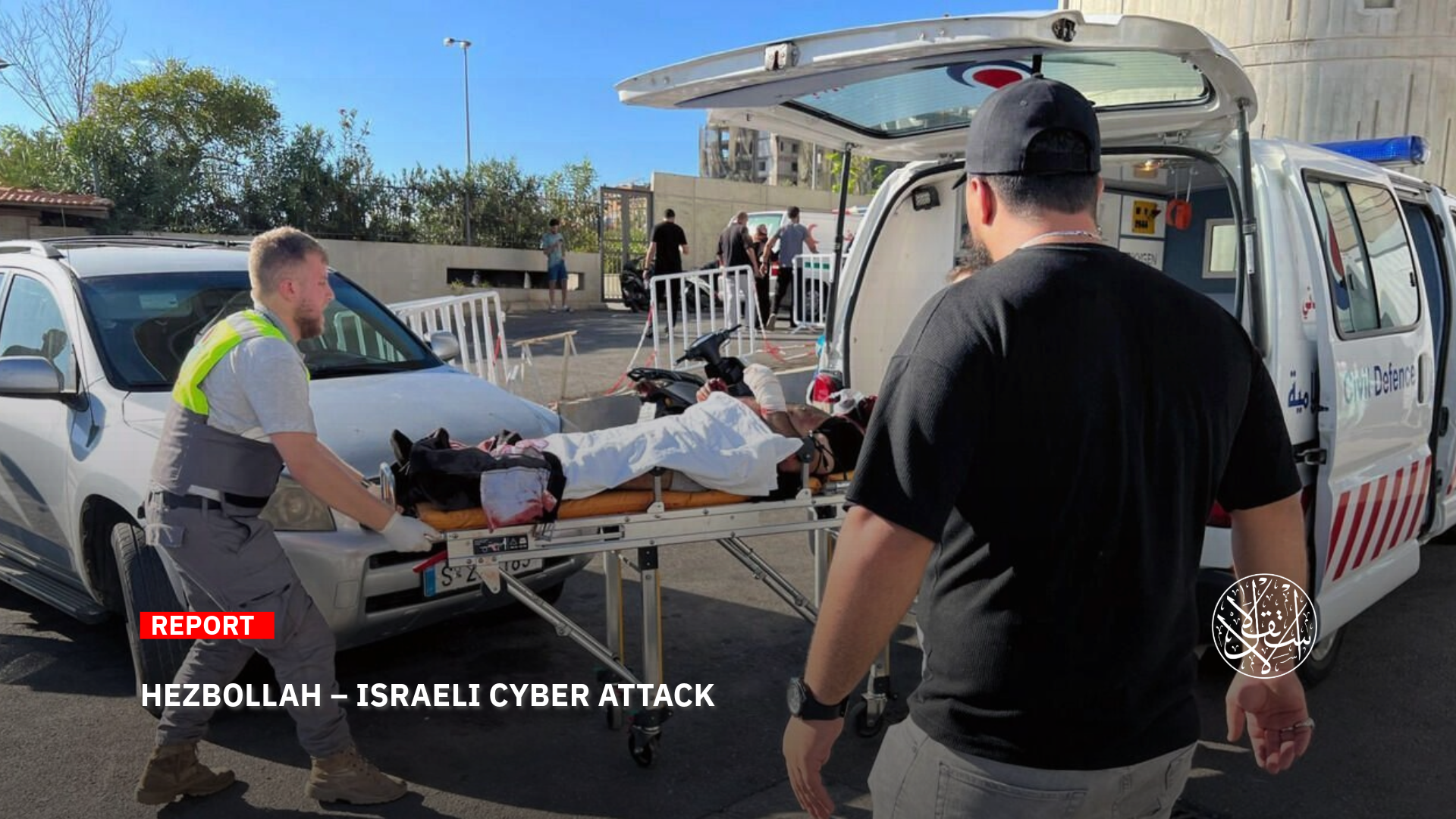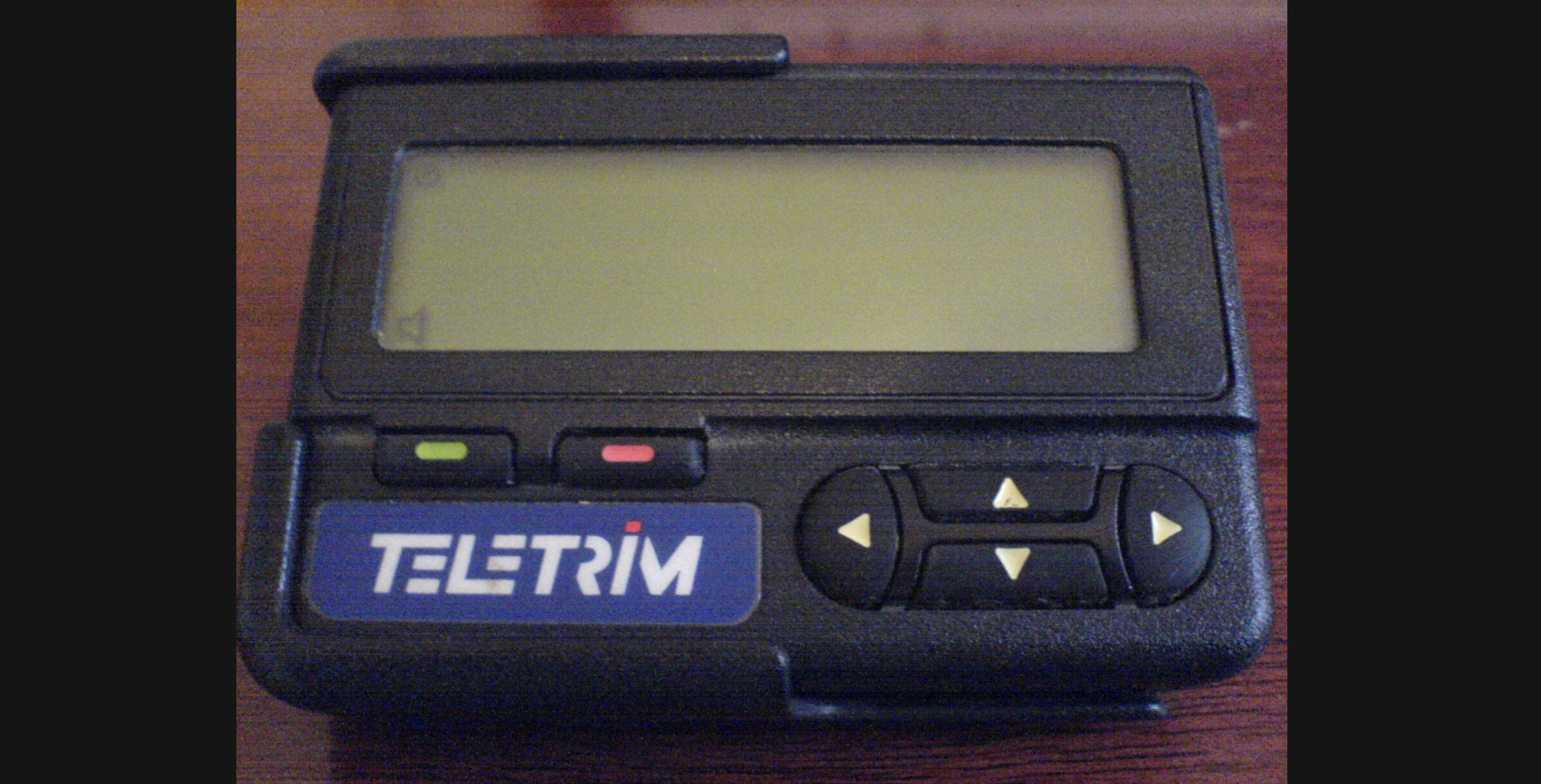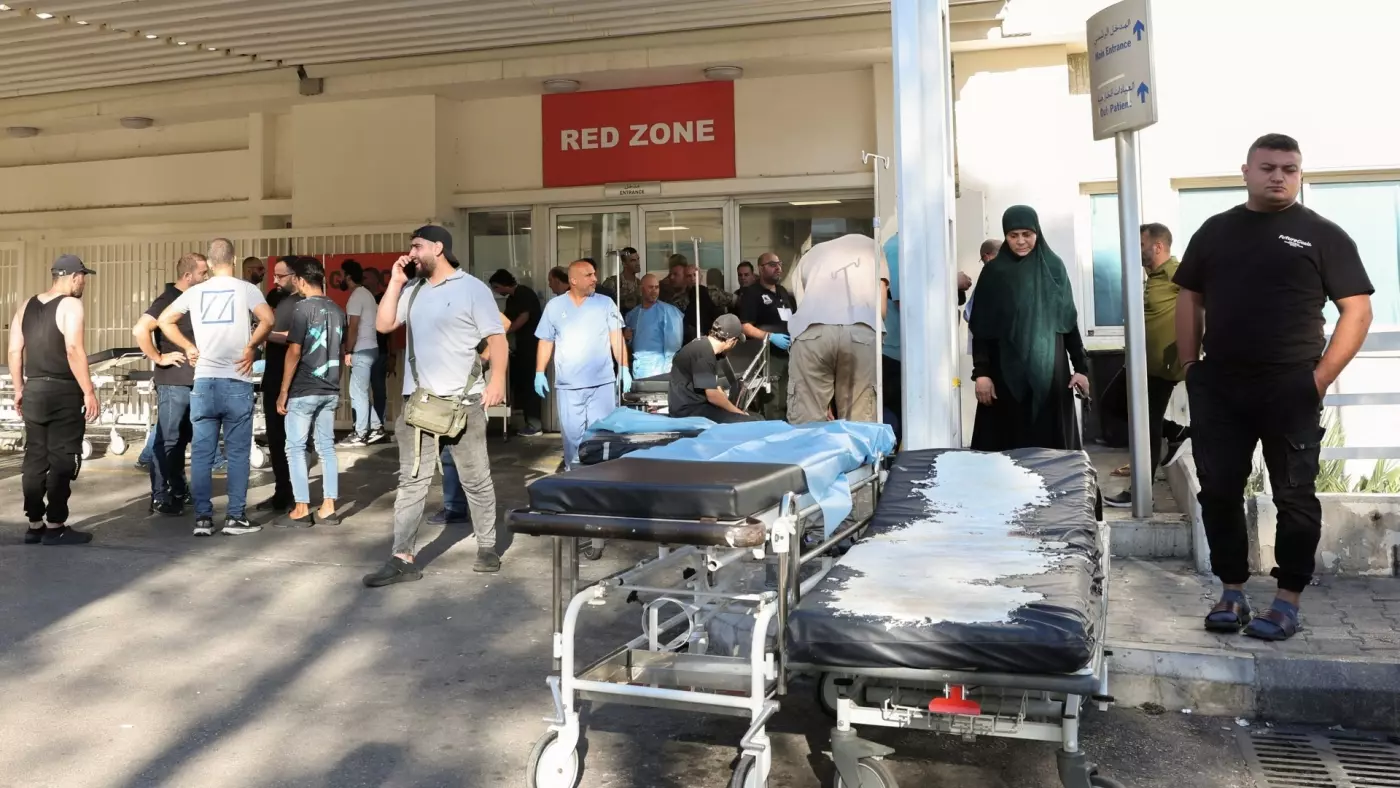Pager Bombings: How Could ‘Israel’ Carry Out the ‘Largest Security Breach’ Against Hezbollah?

“This absolutely has all the hallmarks of a Mossad operation.”
In what is called the “largest security breach” against Hezbollah since October 8, 2023, “Israel” carried out an “unexpected operation” by detonating pagers used by hundreds of Hezbollah members and thousands of Lebanese.
On September 17, 2024, in an unprecedented scene, pager devices used by Hezbollah members and leaders exploded across Lebanon, particularly in the southern suburbs of Beirut, the party’s stronghold.
Pager Attack
Hezbollah has reported that at least two of its members were killed when the portable pager devices they were using exploded in various locations across Lebanon.
Minister of Public Health in Lebanon Firas Abiad stated that at least nine people were killed and approximately 2,750 others injured, with 200 in critical condition, due to the simultaneous explosions of the communication devices throughout Lebanon.
Among the fatalities in the southern suburbs was Mahdi, 40, the son of Ali Ammar, a member of Hezbollah's parliamentary bloc “Loyalty to the Resistance,” with several relatives of Hezbollah leaders injured.
“We hold the Israeli enemy fully responsible for this criminal aggression that also targeted civilians,” Hezbollah said, adding that “Israel will “for sure get its just punishment.”
A senior Hezbollah official told Reuters that the party's leader, Hassan Nasrallah, is safe following the series of simultaneous pager device explosions.
The official, speaking on condition of anonymity, said the incident was the “biggest security breach” for the group in nearly a year of conflict with “Israel.”
Iranian state-run IRNA news agency said that the country’s ambassador, Mojtaba Amani, was superficially wounded by an exploding pager and was being treated at a hospital.
Iranian state media reported that Minister of Foreign Affairs of Iran Abbas Araghchi strongly condemned the “terrorist attack” during a phone call with his Lebanese counterpart and thanked Lebanon for providing immediate medical care to the ambassador.
Additionally, 14 people were injured in the Syrian capital Damascus, and its surroundings in an explosion involving devices belonging to Hezbollah.
Amid the new military dynamics and fears of a potential “full-scale war” between Hezbollah and “Israel,” numerous questions have arisen about how “Israel” managed to carry out such a cyberattack using devices reportedly the latest models imported by Hezbollah three months ago “in complete secrecy.”
Following the Israeli attack on Hezbollah’s core military operations—the party’s communication network—The Wall Street Journal reported that the damaged pagers were from a recent shipment received by Hezbollah in the days leading up to the attack.
The newspaper cited security company Le Beck International, which suggested that the explosions were likely caused by malware.
A Hezbollah official noted that hundreds of fighters have such devices and speculated that malicious software might have caused the devices to overheat and explode.
The primary hypothesis of the attack focuses on the technical nature of the breach, especially since Hezbollah had previously instructed its members not to use mobile phones to avoid any Israeli infiltration, instead implementing its own communication system.
The Monitor later revealed that high-level regional intelligence sources reported “Israel” conducted its pager attack in Lebanon after gathering intelligence indicating that two Hezbollah members had detected the breach.
The newspaper noted that the decision to carry out the operation was prompted by this intelligence breach, which “Israel” deemed urgent to address.
“Israel” had rigged thousands of devices obtained by Hezbollah before delivering them to the party. The original Israeli plan was to detonate the devices in the event of a full-scale war with Hezbollah to gain a strategic advantage.
The Monitor also reported, citing the same sources, that “Israel” faced three options after a Hezbollah member considered informing his superiors about his suspicions.
These options were: launching a war against Hezbollah and detonating the devices as originally planned, detonating them immediately to cause the maximum possible damage, or ignoring the issue and risking exposure of the plan.
Ultimately, the second option was chosen, and the operation remained secret even from the United States.

How Does a Pager Work?
The pager, a small electronic device, was originally designed for receiving text messages or alerts. This system emerged in the mid-20th century as a communication tool before mobile phones became widespread.
A pager is designed only for receiving messages. It can receive a numeric code or a short text message through its communication network, which uses radio waves to transmit messages.
The sender transmits a notification to the recipient's pager through a central transmitting station. Once the pager receives the message, it emits a sound or vibration to alert the user to a new notification.
On February 14, 2024, Hezbollah leader Hassan Nasrallah urged party members, their families, and people from southern Lebanon to abandon mobile phones, calling them “deadly agents” that provide accurate information to “Israel” for free.
The pager, an older technology, cannot connect to the internet, making it relatively secure from cyberattacks and espionage attempts common with mobile or smart phones. Hence, it is still used in military and security contexts.
Despite its age, pager networks can be compromised if their frequency is detected by specialized electronic equipment. Overloading the device can cause its battery to overheat and explode.
Recent reports suggest that newer pager models with enhanced features have been introduced, combining wireless communication with smart applications. These modern pagers allow users to send texts, make calls, and receive alerts without needing mobile phones. They also offer Bluetooth and Wi-Fi connectivity for improved communication.

Cyber Security Breach
In this context, military expert Mounir Shehadeh stated that “what happened was a cyberattack using wireless waves,” noting that “Israel has advanced and highly precise technologies.”
Shihadeh, speaking on television on September 17, mentioned that “Israel has had access to Lebanon’s communication and banking transfer data since 2005 through the International Investigation Committee into the assassination of former Prime Minister Rafik Hariri.”
The military expert, who previously served as the head of the Lebanese permanent Military Court, confirmed that “Israel knows who carries pagers in Lebanon.”
Experts indicated that the pager explosions showed signs of a long-planned operation, though the exact methods were not immediately known.
Investigators had no immediate comment on how the pagers were detonated or if explosives were inserted into each pager device, which has been used by Lebanese since 1990.
In this regard, Yossi Melman, a co-author of Spies Against Armageddon and other books on Israeli intelligence, told The Guardian, “This absolutely has all the hallmarks of a Mossad operation. Somebody has planted minor explosives or malware inside the pagers. I understand they were recently supplied as well.”
Melman said he understood that “a lot of people in Hezbollah carried these pagers, not just top echelon commanders”. They were used by the Lebanese group because they feared their mobile phones were being monitored by Israeli intelligence to surveil their communications and to pinpoint missile attacks.
The exercise showed, he said, that “[the] Mossad is able to penetrate and infiltrate Hezbollah time and time again” but he questioned whether there was any strategic gain to the coordinated explosions. “It won’t change the situation on the ground, and I don’t see any advance in it.”
Some experts suggest that the incident was a cyberattack, arguing that all devices around you contain chips and emit frequencies, and once connected to the internet, they inherently become a security vulnerability.
They point out that most security programs are government-controlled, which means vulnerabilities can be created through the power of cybersecurity capabilities.
A report from CB Insights, a data firm based in New York, reveals that “Israel” ranks second globally in cybersecurity deals, trailing behind the US but ahead of the UK.
According to the report, “Israel” accounted for seven percent of the global cybersecurity deal share between 2013 and 2017.
The images seen Tuesday showed signs of detonation, said Alex Plitsas, a weapons expert at the Atlantic Council.
“A lithium-ion battery fire is one thing, but I've never seen one explode like that. It looks like a small explosive charge,” Plitsas said.
That raises the possibility that “Israel” was aware of a shipment of pagers heading to Hezbollah and managed to modify the pagers before delivery, according to the expert.

‘Electronic Pulse’
Another possibility is an electronic pulse “that was sent from afar and burnt the devices and caused their explosion,” said Yehoshua Kalisky, a scientist and senior researcher at the Institute for National Security Studies, a Tel Aviv think tank.
“It is not some random action; it was deliberate and known.”
Lebanon’s Telecommunications Minister Johnny Corm stated that to address the possibility of the devices being rigged, especially since all the injured are from Hezbollah, an investigation is needed into how and when the shipment arrived in Lebanon, its contents, the purchasing company, and the procurement process. Only after these inquiries can they address the many questions raised.
A source with knowledge of the issue said “Israel” conducted the operation in order to take its fighting against Hezbollah into a new phase, while attempting to still not to escalate to the level of an all-out war, according to Axios.
The Israeli operation was aimed at undermining Hezbollah's confidence and creating a feeling in the ranks of the group that it has been penetrated by Israeli intelligence services, the same source added.
Sources
- Hezbollah vows retaliation after exploding pagers kill at least nine and hurt almost 3,000
- About 3000 wounded in the explosion of communication devices in Lebanon, and Hezbollah accuses Israel [Arabic]
- Hezbollah is hit by a wave of exploding pagers that killed at least 9 people and injured thousands
- Israel didn't tell U.S. in advance about Hezbollah pager attack, officials said
- Hezbollah vows to punish Israel after pager explosions across Lebanon
- The Monitor: Suspicions of two Hezbollah members prompted Israel to accelerate the Pager bombings [Arabic]
- Israel wins second-largest number of cybersecurity deals globally
- Exploding pagers kill Hezbollah members and others, leave thousands wounded, officials say; militant group blames Israel
- Exploding Pagers in Lebanon Spur Theories on Sabotage Method











